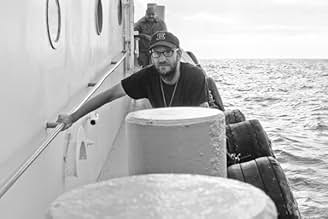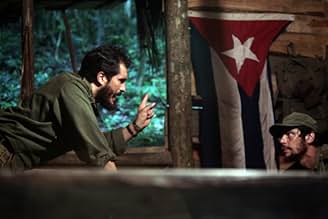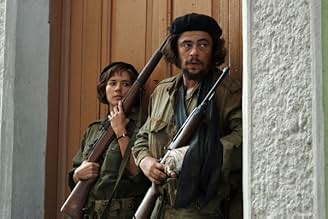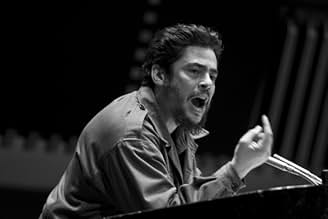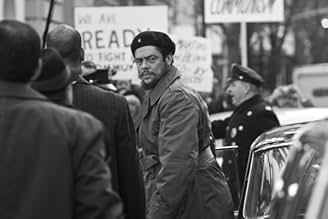1956 में, अर्नेस्टो 'चे' ग्वेरा और कास्त्रो के नेतृत्व वाले क्यूबा के निर्वासितों के एक दल ने तानाशाह फुलगेनसियो बतिस्ता के शासन को खत्म करने के लिए एक सेना जुटाई.1956 में, अर्नेस्टो 'चे' ग्वेरा और कास्त्रो के नेतृत्व वाले क्यूबा के निर्वासितों के एक दल ने तानाशाह फुलगेनसियो बतिस्ता के शासन को खत्म करने के लिए एक सेना जुटाई.1956 में, अर्नेस्टो 'चे' ग्वेरा और कास्त्रो के नेतृत्व वाले क्यूबा के निर्वासितों के एक दल ने तानाशाह फुलगेनसियो बतिस्ता के शासन को खत्म करने के लिए एक सेना जुटाई.
- निर्देशक
- लेखक
- स्टार
- पुरस्कार
- 4 जीत और कुल 13 नामांकन
- Interpreter
- (as Óscar Isaac)
- María Antonia
- (as María Isabel Díaz)
- Fidel Castro
- (as Demian Bichir)
- Héctor
- (as Ramón Fernández)
- Alejandro Ramírez
- (as Yul Vázquez)
- Jorge Sotús
- (as Jsu García)
- Rebel Messenger #1
- (as Luis Rodríguez Sánchez)
- Juan Almeida
- (as Roberto Luis Santana)
फ़ीचर्ड समीक्षाएं
Steven Soderbergh refrains, then, from counteracting the magnitude of Che: Part One's dense political platform by ramping up the fireworks. This wont appeal to mainstream viewers. This is not a Cuban Braveheart. This is not some twisted Scarface prequel. There will be no post-movie pop-art. Che: Part One is an intelligent and vital take on the man behind the myth not a balls-to-the-wall action spectacle blaring with blood, bullets and CGI. It's a thorough and naturalistic treatise on iconic human drive and endeavour that infrequently shuttles between monochrome and Technicolor, between Che Guevara's 1964 delegation at the UN headquarters and time spent trudging through the Cuban jungle.
If your understanding of certain political ideals and movements are, at best, hazy- then it's best to steer clear of this one. You're likely are likely to find the first serving of Soderbergh's four-and-a-half-hour, two part political epic a little confusing. This ain't no Hollywood funded, slick and stylish, over-dramatic chronicle concerned with entertainment or income. This isn't 'Defiance' or 'Valkrye'. This is a well-researched, claustrophobic and paced political drama (shot in Spanish) where spurts of action, violence and humour are few and far between. Imagine Oliver Stone's 'Salvador' by the way of Terrance Mallick's 'The Thin Red Line': fragmented, anti-mainstream and very heavy-going.
The bravura Benicio Del Toro stars as Che and is quite excellent. He delivers a focused and unwavering performance worthy of a thousand accolades: his finest since '21 Grams'. The fact that Del Toro is fluent in Spanish also helps, as does a rallying and unknown supporting cast that work well as a low-key ensemble. It's all about Del Toro, though. His insurgent, intense and convincing Che is one marred by crippling bouts of asthma yet defined by a burning desire to educate and reform- to put his litigious beliefs into action and unite Latin America.
With Che: Part One, the diligent Steven Soderbergh has found his blend of realism and narrative, documentary and drama. As an avid Che fan and reader of his books and biographies, there is little doubt in my mind that this monumental work will stand as the first piece in the definitive two part screen portrait of one the twentieth century's most iconic, yet largely uncharted, political figures.
Final Verdict: While lesser films wallow in the limelight, Che: Part One stirs understated in the shadows seemingly content with the fact that it wont appeal to all, or many. Steven Soderbergh has crafted a very loyal and well-made biopic. One that demythologises, one that educates, one that excels and ensues Walter Salle's soul-searching Che preface: The Motorcycle Diaries.
This battle scene is filmed guerrilla warfare style in an urban environment, with short bursts of action followed by silence as soldiers move into newer/better positions. It all feels very tense and realistic, which makes a nice change to the shaky cam explosion fests that we're used to. This style works well throughout the rest of the film but swaps the city for the jungle.
The flash forward scenes where Che is interviewed and later addresses the United Nations, help to give the story, and Che, more depth and background, whilst giving us insights into his personality and ideology. Along with the battles, these scenes also help to break up the slower parts of the film.
Cinematography in the film is good and occasionally great, with some stunning shots of the Cuban landscape. The black and white scenes are also well shot, without feeling out of place.
On another positive note, Benicio Del Toro does an excellent job portraying Che. He is understated and believable as the man who wanted to change people's lives, focused on doing what he thought was right.
Unfortunately though, I had trouble caring about or even remembering most of the other characters, as dialogue between them isn't particular memorable. Sometimes you almost feel like you're watching a documentary that's trying to teach rather than entertain and this can start to wear, especially when you're reading subtitles. Che may also be shown in a better light than some would like, although honestly I feel the film is fairly accurate in its portrayal of the man and the history.
I'd definitely recommend this film to anyone interested in Che or the events in Cuba. Even if at times things do get a little slow, it's still a rewarding and informative experience.
The acting of the cast all around was very good but Benicio Del Toro took the movie by storm but he did this in a very subtle way. His performance displayed how Che's spirit was able to superseded the hardships faced in the Cuban Revolution. It did not display any brutality or recklessness but a devotion to a cause. Del Toro's perforations was that worthy of an Oscar nomination but I don't think Che Guervara cared to much about awards.
The directing by Steven Soderbergh was visually stunning at times with much of the scenes shot in the forest. What kept the movie upbeat though were the scenes of Che in New York giving interviews and addressing the U.N. It added an extra layer to the film allowing you to see another side of Che. The side in which he shows his political and speaking abilities. The writing was very good with the dialog always keeping you engrossed. The music, though not much of it, was very good and stayed within rhythm of the rest of the film.
Overall the film succeeds in showing Che as a well rounded man never developing into oversimplified or unnecessarily complex portrayal of a man. The movie was very accurate and refused to take on a role of being inspiring or Hollywoodish which I enjoyed. The only problem with the film I had was that it seems to have a little too much of a feel of a war film rather than a biopic. Still I highly recommend this film.
This is not the first time Che's story has been turned into a movie. The 2004 film, The Motorcycle Diaries, examines the formation of Guevara's early politicization, and But Soderberg's film (with Benicio Del Toro in the lead role as Che Guevara), is the first to try and tell the whole story of Guevara's involvement in the Cuban revolution, and his subsequent attempt to spread the revolution to Boliva, where he was eventually caught and killed in October 1967.
Part 1, deals with the fight against Batista. The long hard slog of waging a guerrilla campaign is covered in great detail as a boatload of 82 revolutionaries head for Cuba during November 1956, and the struggle to win Cuba back for the Cuban people begins.
The first film draws extensively on the Guevara's own writings, especially his memoir "Reminiscences of the Cuban Revolutionary War". The months and years of protracted guerrilla warfare are inter-cut with beautifully recreated scenes showing Che addressing the United Nations in 1964, and conducting numerous interviews with a range of media outlets.
Soderberg uses these scenes to explain some of the history and 'back story' to the Cuban revolution, and to give the audience some insight into Che Guevara the man and revolutionary. Part 1 of Che ends in 1959 as Batista flies into exile in the United States, and the revolutionaries under the leadership of Fidel Castro and Che Guevara are about to enter Havana.
Drawing on Guevara's 'Bolivian Diary', Part 2 of Che takes up the story as Che, going under the pseudonym of 'Ramon', lands in Boliva in 1965, and begins trying to recruit local guerrilla's with the intention of overthrowing the ruling government.
Here, his campaign to recruit local peasant farmers fails, and before he and his small band of revolutionaries are able to launch any sort of major anti government attack, they are hunted down and killed with the help of the Central Intelligence Agency.
Che Guevara was wounded and captured on or about October 9, 1967. It is a matter of record that he was alive at the time of his capture, and that he was subsequently shot and killed to ensure he would no longer be able to foment revolution either in Boliva or elsewhere in Latin America. How ironic then that his execution has sparked a 'cult of the revolutionary' that has not diminished over the intervening 40 plus years since his death.
Of course, apart from the Oceans series of films, Soderberg has shown he is socially aware by also directing Erin Brockovich, Traffic (again with Del Toro), and The Good German, so maybe we shouldn't be surprised that he decided to tackle the story of Ernesto 'Che' Guevara.
Don't be fooled by the inclusion of other A-list cast members (Julia Ormond, Matt Damon, Franka Potente, and Lou Diamond Phillips) in Che. All of these actors have minor roles, and small support parts. In fact Matt Damon is on screen for less than two minutes! I can only assume that Soderberg needed some additional well known actors to help secure finance and distribution for the film.
However, this is without a doubt Benicio Del Toros' film. His performance is a revelation. He inhabits the role of Guevara so well, that there are times when I wasn't sure if the historical footage recreated in black and white didn't have the real Che Guevara in them.
According to the program notes, Soderberg is working an a middle part to Che's story. This film will apparently cover Guevara's experiences in Africa. If this is the case, then this trilogy will indeed constitute Steven Soderberg's masterpiece. I can think of no other biopic to rival it, and the finished series should help to keep the legend of 'Che' Guevara alive for at least another 40 years.
Don't get me wrong, there is nothing specifically wrong with this film. It portrays a fairly accurate (if, as I said, sanitised) picture of the March on Santa Clara and the victory of Castro's rebels. However much in the same way as the kind of perpetually running museum film that you can dip in and out of it is largely uninspiring and leaves you feeling quite detached. The problem is not the direction or the acting which does manage to transport you into the heart of a Civil War ravaged Cuba. It is the fact that we learn next to nothing about Cuba, Che himself or the goals of the revolutionaries. We learn nothing of why the Batista regime was so bad that people wanted to overthrow it. Which means that this simply stands alone as a war film where there are lots of explosions, lots of running around and some scenes of people celebrating in the streets. While I understand from reports that Che Part Two is rather different I think that nevertheless the slight blandness of Che Part One means that, though it looks good, it does feel like a rather wasted opportunity.
क्या आपको पता है
- ट्रिवियाFor his role, Benicio Del Toro spent seven years researching Guevara's life.
- गूफ़When the guerrilleros are in the Sierra Maestra, we can hear the coqui (Eleutherodactylus coqui) singing in the night. However, this small frog is endemic to Puerto Rico and the Virgin Islands, thus not possible to be heard in Cuba.
- भाव
Lisa Howard: What is the most important quality for a revolutionary to possess?
Ernesto Che Guevara: El amor.
Cuban Diplomat #1: [translating] Love.
Lisa Howard: Love?
Cuban Diplomat #1: Love of humanity... of justice and truth. A real revolutionary goes where he is needed.
- कनेक्शनFeatured in Así se hizo - Che El Argentino (2008)
- साउंडट्रैकBasura
Written and Performed by Mark A. Mangini (as Mark Mangini)
टॉप पसंद
विवरण
बॉक्स ऑफ़िस
- बजट
- $3,50,00,000(अनुमानित)
- US और कनाडा में सकल
- $7,48,555
- US और कनाडा में पहले सप्ताह में कुल कमाई
- $61,070
- 14 दिस॰ 2008
- दुनिया भर में सकल
- $3,42,09,066
- चलने की अवधि2 घंटे 14 मिनट
- रंग
- ध्वनि मिश्रण
- पक्ष अनुपात
- 2.39 : 1
इस पेज में योगदान दें


